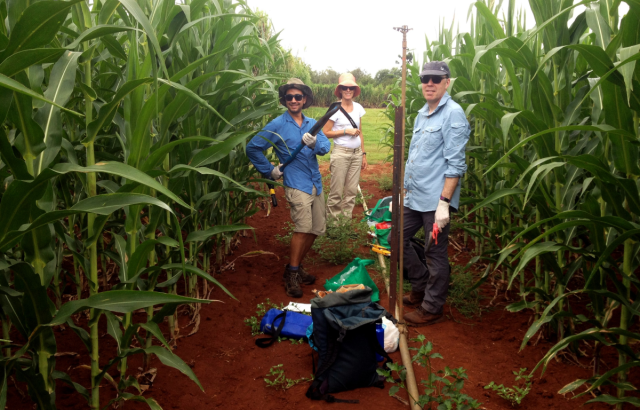Brought to you by Cosmos Magazine and The Echo

For the first time a large scale trial has shown that mycorrhizal fungi might provide an alternative to mineral fertilisers and pesticides on farms.
It is well known that arbuscular mycorrhizal fungi (AMF) can enhance plant nutrient uptake and reduce plant stress. It is available for the home gardener.
It improves the supply of water and nutrients, such as phosphate and nitrogen, to the host plant.
But large-scale field inoculation trials with AMF are missing, and so far, research has been unpredictable or in fact negative.
But a European on-farm experiment, in 54 fields in Switzerland, quantified the effects on maize growth and found some very positive results.
The data, published in Nature Microbiology, showed that while highly variable, in some cases they improved yield by 40%.
Researchers from the universities of Zurich and Basel, Agroscope, and the Research Institute of Organic Agriculture (FiBL) mixed the fungi into the soil before sowing crops on 800 trial plots at 54 maize farms in northern and eastern Switzerland.
“On a quarter of the plots, the mycorrhizal fungi enabled up to 40% better yields. That’s huge,” says the study’s co-lead, Marcel van der Heijden, a soil ecologist at the University of Zurich and at Asgroscope.
But on a third of the plots, the yield did not increase and sometimes even decreased.
“We discovered that the inoculation functioned best when there were lots of fungal pathogens already in the soil,” co-first author Stefanie Lutz from Agroscope, the federal center of competence for Agricultural Research told Phys.org.
“The mycorrhizal fungi act as a kind of protective shield against pathogens in the soil that would weaken the plants. In contrast, mycorrhizal fungi had only a minor effect on fields that were not contaminated with pathogens.
“The plants there are strong anyway and grow excellently. The use of mycorrhizal fungi in such cases brings no additional benefits,” says the other first author, Natacha Bodenhausen from the Research Institute of Organic Agriculture.
Microbiologist Felipe Albornoz, works at Australia’s national science agency the CSIRO. His principal area of research is on using mycorrhizal fungi for restoring degraded ecosystems. Albornoz says in terms of agriculture: “it remains to be seen whether they might replace fertilisers in the future, but other benefits, such as pathogen defence, seem like a promising research venue for both agriculture and ecosystem restoration.
“There are decades of research on mycorrhizal fungi and they are considered one of the most important plant symbionts. They are most known for increasing nutrient uptake, particularly phosphorus, but they offer a myriad of benefits to their plant hosts and to overall soil health” he told Cosmos.
“Mycorrhizal fungi can be purchased (generic strains that are unlikely to benefit all crops in all environments), or can be sourced from soils in nature. In Australia, theoretically speaking, sourcing native mycorrhizal fungi might be more beneficial, since they have evolved to thrive in these nutrient-poor environments.
“Mycorrhizal inoculum can be applied at any scale, from a pot to a field. But the larger the area the more complicated it becomes. Innovation on how to mass-produce mycorrhizal inoculum from local sources would be an immense breakthrough in this field”.



